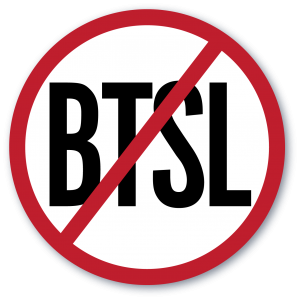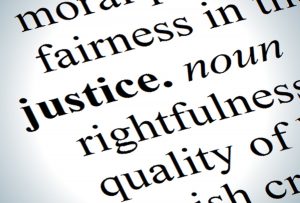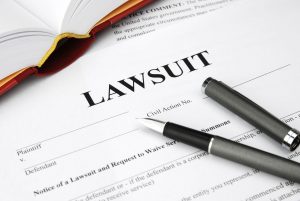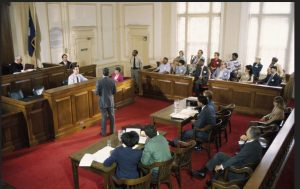 Many people are worried about their case going to trial. This worry is a product of fear of the unknown. These are understandable concerns if you don’t know what’s going on. Communication with your lawyer as you proceed to trial is of utmost importance. I’ve been a trial lawyer for more than 31 years and there are a lot of questions clients ask me about what happens to them before and during a trial. I want to share with you some of the things I’ve learned as a trial lawyer from going to trial and helping my clients prevail at trial. First, don’t panic. Going to court is a good thing. Really.
Many people are worried about their case going to trial. This worry is a product of fear of the unknown. These are understandable concerns if you don’t know what’s going on. Communication with your lawyer as you proceed to trial is of utmost importance. I’ve been a trial lawyer for more than 31 years and there are a lot of questions clients ask me about what happens to them before and during a trial. I want to share with you some of the things I’ve learned as a trial lawyer from going to trial and helping my clients prevail at trial. First, don’t panic. Going to court is a good thing. Really.

Don’t hire one of these if you need to go to court
Whenever my clients make a decision to go to court, they know they’re going to go to court. The decision to go to court is not something that is made lightly. It has to be a working partnership between me and my client. Remember, you’re not going to go to court unless the insurance company for the defendant is being unfair. This is something insurance companies routinely do. An insurance company will always do it if you do not prepare your case from the first day as if it’s going to court. This is the reason why a BTSL (Billboard Television Settlement Lawyer) firm is a problem in the usual personal injury case. If a law firm has lots of customers (because it advertises a lot), the insurance companies know those lawyers cannot take every case trial. So, they offer less in settlement. In the past 15 years, the money offered for settlements have gone down because certain BTSL firms settle for what the insurance company offers, not what a jury would order. So, unless your injury involves death or a broken bone, the insurance companies count on your BTSL firm talking you into settling your case for whatever the insurance company says it will pay, not what a jury would make them repay you. To hire a high-volume BTSL means you will not likely go to court and you won’t get the full value of your case. I have had more than one mediator tell me BTSL firms will “leave money on the table” because they don’t push hard enough in the mediation. They have a dozen other cases like yours. They need you to “go ahead and settle” so they can move onto the next case.
As a person whose case figuring out whether to go to trial, you and your lawyer have to decide whether the insurance company’s money  offer will fairly and reasonably compensate you for that which the company’s insured took from you. If not, you need to go to trial and get a jury to order the cheap insurance company to do the right thing and repay you.
offer will fairly and reasonably compensate you for that which the company’s insured took from you. If not, you need to go to trial and get a jury to order the cheap insurance company to do the right thing and repay you.
First, understand first that going to trial is the last part of a process. You don’t flip the switch and walk in the court with a laptop a month after your injury. I start preparing for trial the first time I sit down with my new client. All of my cases are prepared with an eye toward putting on the best case at trial to get you the full, fair and reasonable repayment of what has been taken from you. You have to prepare every case like this. If you don’t, insurance companies roll right over you and your unprepared lawyer.

A trial is nothing more than teaching a jury about what was taken from you
After an injury, you have a damaged car or bicycle, damage personal items, lost wages, medical bills, pain, suffering, disfigurement, emotional anguish and loss of the enjoyable life that you had before the injury. Hiring a lawyer is turning this problem over to a professional who is going to help and guide you to recover what was taken.
No make no mistake- juries do not have magic wands; all you’re going to get from them is an order (judgment) telling the defendant to pay you the monetary value of all the damages I just laid out. So keep this in mind. Your lawyer has to prove up your damages in order to get the jury to enter the verdict so the judge can sign the judgment and you can get paid back for what was taken from you.
Now, with this background, understand that your job in court is to help your lawyer provide evidence for the jury to find the damages that you know you and your family sustained as a result of your injury. So, essentially, your job will be to help tell your story.
 Perhaps the biggest concern you will have is “how will I tell my story at trial” and, more to the point, “what is my exact involvement in the trial? Well, there are three things you absolutely have to do: 1. Respond to discovery. 2. Give a deposition. 3. Tell your story in court- i.e. testify at trial. Let me go through them one by one.
Perhaps the biggest concern you will have is “how will I tell my story at trial” and, more to the point, “what is my exact involvement in the trial? Well, there are three things you absolutely have to do: 1. Respond to discovery. 2. Give a deposition. 3. Tell your story in court- i.e. testify at trial. Let me go through them one by one.
1. Respond to Discovery – Once you have decided to file suit, your lawyer will prepare what’s called “a complaint and summons.” We do things a little different in our office to get an advantage in the case but I file the complaint and summons to start the whole process. Once those are “served” on the defendant (a process server gives them a copy), his or her lawyer will send you three kinds of papers which are called “discovery.” The three kinds of discovery are: a. “Interrogatories,” b. “Requests for Admissions,” c. “Request or Notice to Produce.” a. Interrogatories are nothing more than questions to you about your case. The insurance company only has the crash or incident report and the statement of its insured or maybe some witnesses so it essentially knows nothing about you. Now, there is a company called Insurance Services Office which provides all insurance companies with the very brief description of any insurance claims you have ever made. Of course, if you have an open social media page (Facebook for example) that doesn’t have highest security settings, the insurance company will snoop in that as well. (In that case, the insurance company can learn a great deal about your private life which it will use against you very effectively.) There are usually 30 interrogatory questions (standardized for Florida automobile injury cases), though the other side might send less. The interrogatory questions ask for much of the information your lawyer already has. However, you will may need to answer some questions about personal information your lawyer might not know. Be prepared to get those questions answered and sent back to your lawyer ASAP. There’s some more advice I can share with you about this, but it’s super secret stuff, so you’d have to be a client. b. Requests for Admission- these are simple questions that ask you to admit or deny something or admit whether a piece of paper is legitimate (“authentic”). You must carefully look at these questions when your lawyer sends them to you and answer them with his assistance. c. Request to Produce – these or requests for documents from you. Usually they want your medical bills, proof of your lost wages, proof of how much you were earning before you got injured, pictures of any damage to your bicycle, car, or your body. However lately and sinisterly, the insurance company lawyers have all been asking for your social media. All of it. That means anything you posted about your crash, incident,injury or treatment on Twitter, Snapchat, Instagram, Facebook, any other social media and your cell phone texts will be read by total strangers over at the insurance lawyers’ office and shared with anybody at the insurance company. (Advice from me: stop posting now) As they say in the Miranda warning (and this applies to all social media): Anything you say can and will be used against you.
 2. The Deposition – Once the insurance company has gotten all this information, its lawyer will schedule your deposition. Now, as I pointed out before about BTSL firms, they have so many cases they can’t spend time preparing your case. Many years ago, a very wise attorney told me that “lawsuits are won and lost during discovery.” Your deposition is part of that discovery, in fact it may be the most critical part of that discovery. Again, I have some more advice to guide you, but you have to be a client. Nevertheless, in a deposition, you have to keep your story straight especially if you were injured before this crash. Insurance companies routinely tell their lawyers to get plaintiffs cases knocked out because the plaintiff is not honest in deposition. To help you do that your lawyer has to sit down with you for several hours and talk to you. He has to explain what the insurance company is going to try to do, what you need to remember, go through all the “discovery” (see above) with you and tell you what it is that he provided to the insurance lawyer. He needs to talk to you about what the insurance company is going to do to make you look bad. Now, before you go much further, keep in mind you have an injury. The doctors said you are injured. I agree with them. You have said that you do. It hurts you. You are entitled to a verdict and a judgment to repay you. All the insurance defense lawyer can do is 1. Make you look bad (like you are lying or exaggerating) so the jury won’t believe you or believe that you should be fully compensated. 2. Bring in hired guns who will say that you are not hurt of if you are hurt there’s just no way whatsoever it is from crashed caused by the insurance company’s customer. For example, these hired guns will say, if you are over 30, “They already had this bad [back, neck, hip, foot, knee (whatever)]. All of this is designed to minimize the amount of money the jury gives you or make the jury disgusted with the whole process so they don’t give you anything. It is important then that your lawyer sits down and talks to you at length about what to expect. Tell him everything that you’re worried about. Ask him any question you want. Listen carefully to his guidance and what he tells you to keep track of. You need to have a list of your doctors in the order that you saw them and what kind of doctors they are so you don’t get confused. You are testifying from your memory in the deposition, so you will want to have a list of doctors so you don’t forget.
2. The Deposition – Once the insurance company has gotten all this information, its lawyer will schedule your deposition. Now, as I pointed out before about BTSL firms, they have so many cases they can’t spend time preparing your case. Many years ago, a very wise attorney told me that “lawsuits are won and lost during discovery.” Your deposition is part of that discovery, in fact it may be the most critical part of that discovery. Again, I have some more advice to guide you, but you have to be a client. Nevertheless, in a deposition, you have to keep your story straight especially if you were injured before this crash. Insurance companies routinely tell their lawyers to get plaintiffs cases knocked out because the plaintiff is not honest in deposition. To help you do that your lawyer has to sit down with you for several hours and talk to you. He has to explain what the insurance company is going to try to do, what you need to remember, go through all the “discovery” (see above) with you and tell you what it is that he provided to the insurance lawyer. He needs to talk to you about what the insurance company is going to do to make you look bad. Now, before you go much further, keep in mind you have an injury. The doctors said you are injured. I agree with them. You have said that you do. It hurts you. You are entitled to a verdict and a judgment to repay you. All the insurance defense lawyer can do is 1. Make you look bad (like you are lying or exaggerating) so the jury won’t believe you or believe that you should be fully compensated. 2. Bring in hired guns who will say that you are not hurt of if you are hurt there’s just no way whatsoever it is from crashed caused by the insurance company’s customer. For example, these hired guns will say, if you are over 30, “They already had this bad [back, neck, hip, foot, knee (whatever)]. All of this is designed to minimize the amount of money the jury gives you or make the jury disgusted with the whole process so they don’t give you anything. It is important then that your lawyer sits down and talks to you at length about what to expect. Tell him everything that you’re worried about. Ask him any question you want. Listen carefully to his guidance and what he tells you to keep track of. You need to have a list of your doctors in the order that you saw them and what kind of doctors they are so you don’t get confused. You are testifying from your memory in the deposition, so you will want to have a list of doctors so you don’t forget.
 3. Testify at Trial – This is different from your deposition. You will be discussing pretty much the same stuff that you talked about in your deposition, but this time you’re telling the people who can actually solve your problem and make the insurance company do the right thing. You will need to prepare several hours again – mostly so you don’t have jitters – but also so you recall everything that you need to tell the jury. There’s some more advice here that I could give you, but again, you have to be a client. In the trial, you will be telling your story from beginning to end -with the guidance and direction of your attorney. You will talk about how you were injured by the defendant, what the pain was and is like, what you had to do to recover, the doctors that you saw, the exercises you had to do to recover, the things that you missed out on, the things you worried about, I think you still worry about, how your injuries affect you now and how your injuries have affected your family friends and your job. Once you have talked about all these issues (and some extra ones your lawyer may go over with you), you’ll be done. The rest of the time is spent listening and pointing out things to your lawyer that you see in the trial.
3. Testify at Trial – This is different from your deposition. You will be discussing pretty much the same stuff that you talked about in your deposition, but this time you’re telling the people who can actually solve your problem and make the insurance company do the right thing. You will need to prepare several hours again – mostly so you don’t have jitters – but also so you recall everything that you need to tell the jury. There’s some more advice here that I could give you, but again, you have to be a client. In the trial, you will be telling your story from beginning to end -with the guidance and direction of your attorney. You will talk about how you were injured by the defendant, what the pain was and is like, what you had to do to recover, the doctors that you saw, the exercises you had to do to recover, the things that you missed out on, the things you worried about, I think you still worry about, how your injuries affect you now and how your injuries have affected your family friends and your job. Once you have talked about all these issues (and some extra ones your lawyer may go over with you), you’ll be done. The rest of the time is spent listening and pointing out things to your lawyer that you see in the trial.
Although it’s a long and involved process for your attorney, a well-prepared attorney will make it easy for you to have your case go to court. The only thing you need to do is to help him whenever he needs you to answer questions or get documents or other evidence for him.
Going to court can be a long and involved process but in the hands of a good attorney, it’s not a rough experience. You will get to see the justice system of United States of America which, in this lawyer’s belief, is the best system of justice in the world.
S top clicking now if you are injured and searching for an attorney. I am a full-service personalized, personal injury lawyer with a statewide practice in all 67 counties. I have 31 years of experience to put to work for you. Call so I can answer your questions: 1-800 – 535 – 3002. Email: [email protected] Skype: ScienceCan Facebook: https://www.facebook.com/JSteeleLaw/ Twitter: @JSteeleOlmstead or @FlaBicyleLawyr Whatsapp: J. Steele Olmstead Instagram: jsteeleolmstead.
top clicking now if you are injured and searching for an attorney. I am a full-service personalized, personal injury lawyer with a statewide practice in all 67 counties. I have 31 years of experience to put to work for you. Call so I can answer your questions: 1-800 – 535 – 3002. Email: [email protected] Skype: ScienceCan Facebook: https://www.facebook.com/JSteeleLaw/ Twitter: @JSteeleOlmstead or @FlaBicyleLawyr Whatsapp: J. Steele Olmstead Instagram: jsteeleolmstead.
© 2018 J. Steele Olmstead, P. A., All rights Reserved
